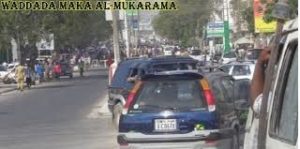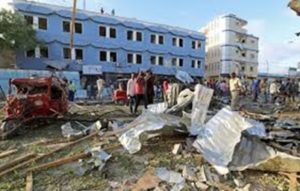By Hassan M. Abukar
The last time I visited Mogadishu was in 1987, and the last time I lived there was 40 years ago when I was a teen. Then, I finally visited last month.
At times, I didn’t know whether to laugh or cry. On the one hand, I saw a city that has undergone what one might consider a Kafkaesque ordeal—two decades of civil war had cemented the city’s seemingly catastrophic plummet from grace. On the other hand, the city was brimming with an atmosphere of hope and a sense of newfound optimism. There was a tangible feeling that the residents of Mogadishu believe the city is in the process of becoming an emblem of triumph over adversity. In a way, I needed some psychic distance from a nostalgic past to face today’s reality.
The first hour
In my first hour after arriving in Mogadishu, I encountered two minor incidents.
 First, immediately after I landed, I stood in a long line designated for foreigners entering the country. I thought the word “foreigner” had a painful ring to it. After all, I was the one who had left Somalia as a teen and gained citizenship elsewhere. Most of the Somali passengers in that Turkish Airlines flight from Istanbul to Mogadishu were like me and were standing with me before the immigration officer. Only a small number of Somalis from the flight stood at the window for “Somali nationals and citizens.” We “foreigners” had to pay $60 to enter our native country.
First, immediately after I landed, I stood in a long line designated for foreigners entering the country. I thought the word “foreigner” had a painful ring to it. After all, I was the one who had left Somalia as a teen and gained citizenship elsewhere. Most of the Somali passengers in that Turkish Airlines flight from Istanbul to Mogadishu were like me and were standing with me before the immigration officer. Only a small number of Somalis from the flight stood at the window for “Somali nationals and citizens.” We “foreigners” had to pay $60 to enter our native country.
As I waited to be processed for entry, I heard my name being called by an airport employee holding a cell phone:
“Hassan Abukar.”
“Yes, I am Hassan Abukar,” I responded.
“Here,” the man said, “talk to the director of the office of the presidency.”
“Are you ‘Hassan Abukar’ from America?” the voice said.
“Yes.”
“Well, welcome home.”
The airport employee smiled and took the phone back. He said he would meet me at the baggage claim.
After I was done with immigration, the man came back and told me the official I had just spoken with had sent him my picture. I know I had not met the official, nor sent him my picture. However, I wondered why the employee was calling my name if he had my photo. Perhaps, my images in some of my writings online had generated a little notoriety.
I am not a cleric, but I remembered an anecdote about a famous Yemeni cleric who was undertaking a trip to Saudi Arabia. Being a man with vanity, he wondered if the Saudis would recognize him as a “sheikh.” At Jeddah airport in Saudi Arabia, he was received by a young Saudi who called him “sheikh.” The cleric was so pleased that he had been recognized as a man of cloth, and relaxed. Then, as he and the young man strolled in the city, a dog tried to cross the street but was repelled by the Saudi yelling: “Idlac yaa sheikh.” (Get out of here, sheikh). The Yemeni cleric realized that the Saudis were hopeless because they used the word “sheikh” on everything— people and animals.
The airport employee was kind enough to take my luggage to the parking lot and asked a young man in an SUV to drop me at a hotel in the Waberi District. Another young man from the same flight—who was born and raised in Saudi Arabia, but lived in Europe—rode with us. Neither of them had yet been born when I last saw Mogadishu.
Second, as we left the airport, I saw a landscape that seemed utterly strange to me. Makka al-Mukarrama Road, a major road artery in Mogadishu, was narrow, dusty, and thronged with people. Pedestrians paid little attention to cars that rushed through perilous, chaotic traffic. On the other side of the road, I saw a goat strolling on the pedestrian side unattended—a subject I will come back to later.
I saw a soldier holding a machine gun, signaling for cars to stop. When he raised his hand toward my car, the young driver simply ignored him and sped away. Suddenly, the soldier started chasing our SUV. In seconds, I thought we would be fired upon and I ducked for cover. The driver was nonchalant; he had the disinterested look of a youngster who had spent years fighting in the streets of Mogadishu.
“The soldier just wants a ride,” the young driver said sarcastically, with a glint in his eye.
I felt a small wave of relief; the incident had made my skin crawl. I was bewildered by the small extent it took for the younger generation of Mogadishu to see life endangered or lost.
The driver and the other passenger started talking about the hotel I was headed to. It was (and still is) a temporary home for some government officials, legislators, and United Nations contractors. A year earlier, several Al-Shabaab terrorists had attacked the hotel with a fusillade of gunfire, hand grenades, and finally a car bombing. Fortunately, the armed security guards fought back tenaciously and killed three of the terrorists. Moreover, the hotel’s strategic location—not being on Makka al-Mukarrama Road—saved the day. However, the building in front of the hotel though, was wrecked. A dozen people, mostly women selling vegetables, perished.
“So, when was the last time you were in Mogadishu?” the driver asked me once again.
“Thirty-one years ago,” I said.
He offered little in the way of reassurance, saying: “I think we shouldn’t be talking about bombings and other violent acts.”
“When your time comes,” I replied, putting on a brave face, “you will find no human can prevent it.”
I have written extensively about Al-Shabaab and its terror campaign, but from the comfort of my home in the U.S. Now, I was headed to the very hotel that they had targeted a year earlier.
Wake up, it is a car bombing

Six days after my arrival, I met a friend from San Diego, California, who loves baked chicken. He and his companion walked to a restaurant a block away from the popular Wehliya Hotel with me. It was a nice outing in which we reminisced about good times in Southern California.
The next day, my friend asked me if we could meet again at the same restaurant for lunch. I told him I was tired; I asked him and his friend to meet me instead at the restaurant in my hotel. The two came and we had lunch. We then sat outside the restaurant and drank tea. After a while, I excused myself and went upstairs to my room. Lying down, I dozed off. Thirty-eight minutes later, I heard a huge, loud blast that sounded as if the hotel was under attack by Al-Shabaab terrorists. I felt my time was up and that I had to face death. Ironically, I remembered the words of American filmmaker/comedian Woody Allen: “I am not afraid of death; I just don’t want to be there when it happens.”
The big blast was followed by a fusillade of gunfire and yelling among the hotel’s dozen security guards. My California friend later told me he had heard a hotel manager ordering guests to get their handguns. It was then that I realized that some of the guests were indeed armed and ready to fight. Those of us who were neither government officials nor armed were left to our own devices; ducking, hiding, and expecting the worst. We became like the wife of one Somali man in Salt Lake City, Utah, who had called 911 to complain about her. When asked, “Is she armed?” The husband quickly responded, “No, but she has long nails.” I believe all the hotel guests, who were men, did not even have long nails to defend themselves! In short, the frenzy that ensued following the bombing had all the making of a Hollywood horror film—except that this was real.
I got text messages from my friend asking me not to leave my room.
“It is a suicide car bombing at the Weheliye Hotel,” he said.
In fact, it was a building a block from the Weheliye Hotel, a stone’s throw from where we had dined the previous day. The incident destroyed a business and left 14 people dead, and ten others wounded. The victims, who were drinking tea at an outdoor café, were civilians who were caught in the war between the government forces and Al-Shabaab. A young couple visiting from Europe were among those killed.
Minutes after the incident, ambulances arrived, but the gunfire persisted. Since there were many guns available to the security guards of nearby hotels, the display of firepower was palpable. It seemed an attempt by these armed men to mark their territory to avert further attacks. When the army and police finally came, they too started firing into the air to disperse the crowd that had rushed to the crime scene. Some pedestrians came to aid the victims, because the ambulances and the authorities were somewhat late.
Hassan M. Abukar
———–
Hassan M. Abukar is a contributor to Wardheernews and the author of Mogadishu Memoir. He can be reached at: [email protected].
We welcome the submission of all articles for possible publication on WardheerNews.com. WardheerNews will only consider articles sent exclusively. Please email your article today . Opinions expressed in this article are those of the author and do not necessarily reflect the views of WardheerNews.
WardheerNew’s tolerance platform is engaging with diversity of opinion, political ideology and self-expression. Tolerance is a necessary ingredient for creativity and civility.Tolerance fuels tenacity and audacity.
WardheerNews waxay tixgelin gaara siinaysaa maqaaladaha sida gaarka ah loogu soo diro ee aan lagu daabicin goobo kale. Maqaalkani wuxuu ka turjumayaa aragtida Qoraaga loomana fasiran karo tan WardheerNews.
Copyright © 2024 WardheerNews, All rights reserved


